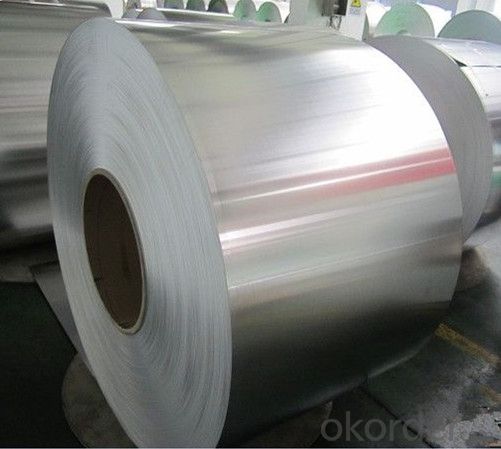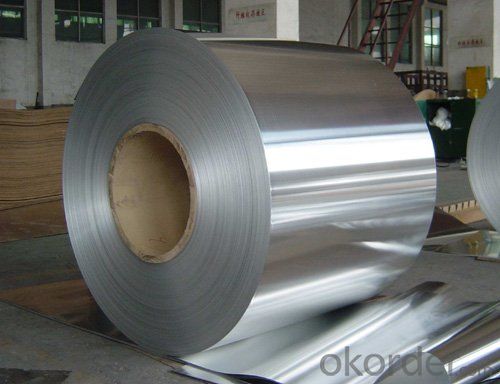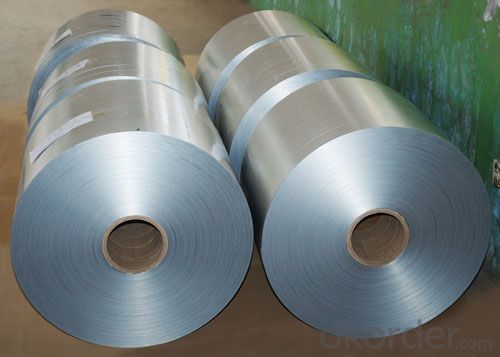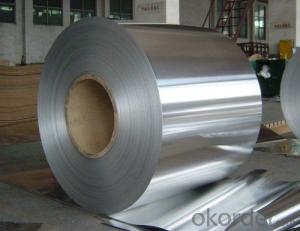5083 H112 / H116 6063 Aluminum Sheet Plate 0.1-16mm
- Loading Port:
- Shanghai
- Payment Terms:
- TT OR LC
- Min Order Qty:
- 5 m.t.
- Supply Capability:
- 5000 m.t./month
OKorder Service Pledge
OKorder Financial Service
You Might Also Like
Item specifice
5083 H112 / H116 6063 Aluminum Sheet Plate 0.1-16mm
Packaging & Delivery
| Packaging Details: | Standard seaworthy packages in bundles or as per requirement. Container size: The inner size of container is below: 20ft GP: 5.8m(length) x 2.13m(width) x 2.18m(high) about 24-26CBM 4 0ft GP: 11.8m(length) x 2.13m(width) x 2.18m(high) about 54CBM 40ft HG: 11.8m(length) x 2.13m(width) x 2.72m(high) about 68CBM(stainless steel seamless pipe) |
| Delivery Detail: | Within 5-15 days after deposit(price of aluminum coil) |
Our Services
1. Provide products with high quality and reasonable price
2. The first time back to you
3. Perfect after-sale service
4. Small order is acceptable
5. OEM is acceptable
6. 12Months quality guarantee
7. Any third party testing is acceptable
Product Description
| Product Name | Prices of aluminum coil |
| Standard | JIS, AISI, ASTM, GB, DIN |
| Alloy | Yes |
| Width | 720-1250mm or as the customers' requirements |
| Length | 10000-12000mm mm or as the customers' requirements |
| Thickness | 0.12-1.5mm |
| Surface | Black painted,PE coated,GL,color coated,etc |
| Item | steel plate,steel sheet,alloy plate,alloy sheet |
| Application | construction field, ships building industry, petroleum & chemical industries, war and electricity industries, food processing and medical industry, boiler heat exchanger, machinery and hardware fields ,etc. |
| Packing | Export standard or as customers' requirement |
| Delivery time | Within 7 working days, according to customers' quantities |
| Payment | L/C or T/T or as customers' requirement |
| MOQ | 1 Ton |
| Quality | High Quality. We can Provide SGS inspection if you need . |
| Productivity | 60000 Tons/Month |
| Attention | We will supply you good quality and bottom price and first-class service in china and hope to be your golden supplier |



- Q:What are the common surface treatments applied to aluminum coils?
- There are several common surface treatments that are applied to aluminum coils to enhance their durability, appearance, and resistance to corrosion. One of the most common treatments is anodizing, which involves creating a layer of oxide on the surface of the aluminum through an electrochemical process. This not only adds a protective barrier against corrosion but also allows for the application of various colors and finishes. Another common surface treatment is painting or coating. Aluminum coils can be painted with a wide range of colors and coatings to provide additional protection against corrosion, as well as to improve their aesthetic appeal. These coatings can be applied through various methods, such as powder coating or liquid spray, and can offer different levels of durability and resistance to environmental factors. Additionally, aluminum coils can undergo a process called laminating, in which a protective film or layer is applied to the surface. This film can provide added resistance to scratches, abrasions, and UV rays, making the coated aluminum coil suitable for outdoor applications. Furthermore, embossing or texturing is another surface treatment commonly used on aluminum coils. This process involves creating patterns, designs, or textures on the surface of the aluminum, which not only enhances its visual appeal but also provides additional structural strength and grip. Overall, the choice of surface treatment for aluminum coils depends on the specific requirements of the application, including the desired appearance, durability, and environmental factors. It is important to consider factors such as corrosion resistance, weatherability, and aesthetics when selecting the appropriate surface treatment for aluminum coils.
- Q:How are aluminum coils used in electrical applications?
- Due to their advantageous properties, aluminum coils find wide application in various electrical uses. Transformers, motors, and inductors are the primary domains where these coils are employed. Transformers utilize aluminum coils to facilitate the transfer of electrical energy from one circuit to another. These coils are wrapped around a magnetic core, thereby facilitating efficient energy transfer. Aluminum coils are preferred over copper coils in transformers due to their affordability, light weight, and superior conductivity. Moreover, aluminum coils exhibit higher thermal conductivity, enabling better heat dissipation. This feature is crucial for maintaining transformer efficiency and longevity. In motors, aluminum coils serve as the winding material for the stator, which is the stationary component of the motor. By passing an electrical current through the coils, a magnetic field is generated. This magnetic field interacts with the rotating magnetic field produced by the motor's rotor, resulting in motor rotation. Aluminum coils are favored in motors due to their lightweight nature, contributing to overall motor efficiency by reducing its weight. Inductors, another electrical component, employ aluminum coils. Inductors store electrical energy in the form of a magnetic field. When an electric current traverses the coil, a magnetic field is generated, which opposes changes in the current. Aluminum coils are utilized in inductors owing to their high electrical conductivity, facilitating efficient energy storage and release. In summary, aluminum coils are extensively used in electrical applications due to their cost-effectiveness, lightweight nature, excellent conductivity, and high thermal conductivity. Their application in transformers, motors, and inductors plays a pivotal role in ensuring efficient and reliable operation of electrical systems.
- Q:I need ideas on soundproofing a 12' aluminum fishing boat?
- Boat Soundproofing
- Q:I need to make aluminum powder that is fine! I don't have a mill to use or something like that. If I fill literally the whole coffee blender, will that get it fine? I want to make an ok amount of it. I tried to use sand paper which makes it as fine as I want it but takes a while of sanding.
- How to make fine aluminum powder?
- Q:What is the typical yield strength-to-density ratio for aluminum coils?
- The typical yield strength-to-density ratio for aluminum coils can vary depending on the specific grade of aluminum being used. However, in general, aluminum has a relatively high strength-to-density ratio compared to many other metals. This means that it can provide good mechanical properties while still being lightweight. For example, the most commonly used grade of aluminum for coils, 3003 aluminum, typically has a yield strength-to-density ratio of around 0.53 MPa•m^3/kg. This means that for every unit of density (mass per unit volume), the material can withstand approximately 0.53 megapascals (MPa) of stress before it starts to deform permanently. Other high-strength aluminum alloys, such as 5052 or 6061, can have even higher yield strength-to-density ratios, reaching up to 0.6 MPa•m^3/kg or more. These alloys are often used in applications where higher strength and durability are required, such as in aerospace or automotive industries. Overall, the yield strength-to-density ratio of aluminum coils is typically quite favorable, making aluminum a popular choice for a wide range of applications that require both strength and lightweight properties.
- Q:I have a couple aluminum baking sheets, and when i wash them, then dry them with a towel, it turns the towel black? why is this? are these still ok to use? Ive been putting one of those silicone baking sheets or parchment paper on the sheets because of this. but i cant really do that with the cake pan. so how do i stop it from doing this?
- an basic recipe for honey baked bananas. components: 6 bananas 2 tablespoons melted butter 2 tablespoons lemon juice a million/4 cup honey guidance: Peel bananas, halve lengthwise and place in a shallow baking dish. blend at the same time melted butter, lemon juice, and honey. Brush honey blend on bananas. Bake bananas at 325° for 15 minutes, turning 3 or 4 situations. Honey baked banana recipe serves 6 to 12.
- Q:Are aluminum coils suitable for electrical transformers?
- Yes, aluminum coils are suitable for electrical transformers. They have several advantages, including lower cost, lighter weight, and better thermal conductivity compared to copper coils. Additionally, aluminum coils have been widely used in power transformers, demonstrating their suitability for this application.
- Q:What are the fire-resistant properties of aluminum coils?
- Due to its inherent characteristics as a metal, aluminum exhibits excellent fire-resistant qualities when formed into coils. With a melting point of 660 degrees Celsius (1220 degrees Fahrenheit), aluminum can endure high temperatures without melting, thereby making aluminum coils resistant to fire hazards. Furthermore, unlike certain other metals, aluminum does not produce flammable gases when exposed to fire. This non-combustible attribute prevents the fire from spreading and minimizes the potential for fire-related damages. Additionally, due to its low thermal conductivity, aluminum does not efficiently conduct heat. Consequently, aluminum coils do not facilitate the transfer of heat from one area to another, which aids in containing and controlling the fire's spread. Moreover, aluminum coils frequently undergo a protective coating process to enhance their fire resistance. These coatings, composed of materials like polyvinylidene fluoride (PVDF) or polyester, create an additional barrier against fire and heat. Engineered to withstand extreme temperatures while maintaining their integrity, these coatings further bolster the fire-resistant qualities of aluminum coils. In summary, aluminum coils possess exceptional fire-resistant characteristics owing to their high melting point, non-combustible nature, low thermal conductivity, and protective coatings. These attributes make aluminum coils a dependable choice for applications where fire safety is paramount, such as in building construction, electrical wiring, and transportation industries.
- Q:Are aluminum coils suitable for electrical insulation applications?
- No, aluminum coils are not suitable for electrical insulation applications.
- Q:How are aluminum coils tested for thickness and flatness?
- Various methods are employed to test aluminum coils for thickness and flatness, ensuring they meet the necessary specifications. One commonly used method is non-destructive eddy current testing. This involves passing an alternating current through the coil and measuring the changes in the magnetic field caused by the eddy currents induced in the aluminum. By analyzing these changes, the thickness of the coil can be determined. Ultrasonic testing is also utilized to measure the thickness of aluminum coils. This method involves sending ultrasonic waves through the coil and measuring the time it takes for the waves to bounce back. It is highly accurate and capable of identifying any variations in thickness throughout the entire coil. To assess the flatness of aluminum coils, a straight edge or laser beam is often employed. The coil is placed on a flat surface, and the straight edge or laser beam is positioned across its surface. Any deviations from perfect flatness can be easily identified by observing the gaps or irregularities between the coil and the straight edge or laser beam. For a more comprehensive analysis of flatness, advanced technologies like laser profilometry can be used. This involves creating a three-dimensional map of the coil's surface, providing highly detailed information about any variations in flatness across its surface. In conclusion, aluminum coils are subjected to rigorous testing procedures to ensure they meet the necessary standards for thickness and flatness. These tests are essential in maintaining the quality and reliability of aluminum coils, particularly in applications where precision and consistency are crucial.
1. Manufacturer Overview |
|
|---|---|
| Location | |
| Year Established | |
| Annual Output Value | |
| Main Markets | |
| Company Certifications | |
2. Manufacturer Certificates |
|
|---|---|
| a) Certification Name | |
| Range | |
| Reference | |
| Validity Period | |
3. Manufacturer Capability |
|
|---|---|
| a)Trade Capacity | |
| Nearest Port | |
| Export Percentage | |
| No.of Employees in Trade Department | |
| Language Spoken: | |
| b)Factory Information | |
| Factory Size: | |
| No. of Production Lines | |
| Contract Manufacturing | |
| Product Price Range | |
Send your message to us
5083 H112 / H116 6063 Aluminum Sheet Plate 0.1-16mm
- Loading Port:
- Shanghai
- Payment Terms:
- TT OR LC
- Min Order Qty:
- 5 m.t.
- Supply Capability:
- 5000 m.t./month
OKorder Service Pledge
OKorder Financial Service
Similar products
New products
Hot products
Hot Searches
Related keywords




























